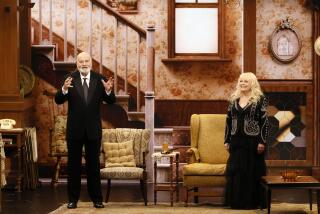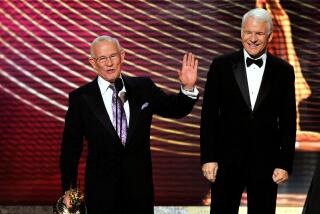SURVIVORS OF THE ‘FAMILY’
- Share via
“One Man’s Family,” although fictional, was, in a sense, quite real to its creator, Carlton E. Morse.
At least, that’s the opinion of three of the seven actors--the only survivors--in the original cast of the NBC radio serial that ran 27 years.
Morse was born in Jennings, La., and raised on an Oregon farm. He came from a large family (three brothers and two sisters), but he and his late wife of 60 years, Patricia, decided early in their marriage to have no children. He would devote his life to his work; she would devote hers to him.
And so it went until 1949, when the couple, almost in their 50s, adopted a war orphan--Noel Canfield. She now lives in Sacramento with her husband and three children, but Morse doesn’t see much of them.
Morse’s radio “Family” was headed by Henry Barbour, a retired stockbroker, and his wife, Fanny. They had five children--Paul, Hazel, twins Clifford and Claudia, and Jack. More than 100 other characters came and went through the years.
“Not having his own family, he created one,” said Michael Raffetto, who played Paul. “Psychologically, it was good for him. A lot of problems he worked out by writing.”
Raffetto, 87, lives with his wife, Connie, in Berkeley. In a telephone interview, he commented about his relationship with Morse:
“I have ambivalent feelings,” he said. “He had no theatrical experience. He was kind of a country boy, but a determined country boy. . . . He loved his stuff, but a lot of it, I think, was naive.
“I had graduated from law school, worked for a law firm and I thought I was sophisticated, but I really wasn’t. I directed drama classes at the University of California at Berkeley, and I thought I knew about acting.
“He proved to be so successful, he must have done what was right as far as success was concerned.”
Quoted in a San Francisco Chronicle article last year, Raffetto described Morse as “basically a very shy person. He doesn’t communicate verbally very well and has trouble being socially at ease. But he’s a warm, loving person. I remember Carlton sitting there as we read through the script. If there was a sentimental or sad scene, the tears would roll down his cheeks.”
Raffetto, who went on to make a few silent movies and had a part in “A Foreign Affair,” starring Marlene Dietrich in 1948, was “better in radio,” he said with a laugh, “where you couldn’t see me.”
Jack Gilman, 68, a former newspaper business manager of the Watsonville (Calif.) Register-Pajaronian who retired in 1983 to become a farmer in Roseburg, Ore., was 14 when he accepted the role of Jack in “Family.” But he was not a newcomer, having worked in radio since he was 9.
“It was like a (real) family,” he said of his relationship with the cast. “In a sense, Carlton’s role was like that of a father. Our own relationship was quite close. His excellence as a writer became evident early.”
Gilman remembered the “good money” he was paid in 1946--a top weekly salary of $400--after starting at about $25 in 1932. At Morse’s peak, he earned $200,000 a year.
The show generated little controversy, Gilman recalled. “Carlton’s aim--and he kept repeating it--was pretty much to protect and reinforce the role of the family in American life.”
Bernice Berwin, who has been retired since 1959 and lives in Oakland, played Hazel and also was plucked from within NBC.
Asked her age, she gasped, “That’s a crazy question. I’m not going to tell you. The others are men.”
She spoke highly of Morse and the close-knit cast of “Family,” which she finally left less than a year before the show was canceled.
“I was the first person to know about Carlton’s idea to create the show,” she said. “He told me the year before it went on. We had a very close relationship and I became very close to his wife.”
Because she maintained homes in Oakland and Southern California, Berwin commuted for more than 20 years while trying to raise a son. The work became “very hectic. The last year it wasn’t fun anymore,” she said. “It was horrible.”
More to Read
The complete guide to home viewing
Get Screen Gab for everything about the TV shows and streaming movies everyone’s talking about.
You may occasionally receive promotional content from the Los Angeles Times.






